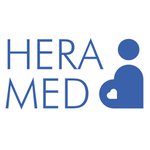HMD Set to Create One of the World’s Most Advanced AI-Based Pregnancy Monitoring Diagnostic Tools
If 2019 was a watershed year for HeraMED (ASX:HMD), then 2020 could be the year the company comes of age. It all has to do with its Artificial Intelligence (AI) platform, a cloud based machine learning software-as-a-service (SaaS) platform, known as OrionAI.
AI is having an enormous impact in healthcare.
Take Amazon for example.
Amazon’s AI revolutionised product search inquiries, personalised recommendations, demand forecasting, fraud protection and warehouse fulfilment.
That’s not enough for Amazon. The $924 billion capped company is entering the healthcare field. In 2019, it announced a joint healthcare venture with JPMorgan Chase and Berkshire Hathaway.
The Amazon-JPM-Berkshire partnership seeks to build an independent healthcare company “free from profit-making incentives and constraints.”
Given its scale and reach, there is little doubt Amazon will transition into this space effectively.
The company has a direct distribution advantage to over 300 million active customers, 100 million Prime Members, and approximately five million sellers on its site. The new partnership gives it an additional pool of more than 1.2 million diverse employees on whom to test its products before releasing them to the public.
Amazon has scale. It has reach. It has one of the most powerful AI tools on the planet. And it has the desire to deliver better healthcare solutions.
AI and healthcare are two of the biggest markets in the world.
AI is expected to contribute approximately US$16 trillion (A$23 trillion) to the global economy by 2030.
According to PwC, “45% of total economic gains by 2030 will come from product enhancements, stimulating consumer demand. This is because AI will drive greater product variety, with increased personalisation, attractiveness and affordability over time.
Meanwhile, the healthcare industry was valued at nearly $8 trillion in 2018, having grown at a compound annual growth rate (CAGR) of 7.3% since 2014, and is expected to grow at a CAGR of 8.9% to nearly $11 trillion by 2022.
The digital healthcare niche is predicted to reach US$423 billion by 2024, while the AI healthcare market is set to jump to US$36 billion by 2025.
Amazon understands that by combining products and services within the two industries, they could as Deloitte posits, help streamline health care delivery and align it with changing consumer preferences.
This is what HeraMED is already doing. Not to the scale that Amazon is expected to achieve, but its numbers would no doubt impress Amazon executives.
The medical technology company, which has a former LinkedIn data scientist pushing its AI forward, has been working closely with the world renowned Mayo Clinic on the OrionAI platform to help transform healthcare, specifically for expectant mothers.
HeraMED's OrionAI harnesses and utilises big data to analyse and evaluate thousands of records in real time, enabling unprecedented accurate analysis and potentially detecting pregnancy complications before they become a problem.
The success of OrionAI is instrumental in helping HeraMED to achieve its vision of dramatically improving the lives of expectant mothers and unborn children, while reducing costs and optimising the physician’s efficiency.
The platform is set to receive a massive boost, after it was announced that it has received approximately 90,000 digital pregnancy records from the Mayo Clinic, bringing years of proprietary R&D to HeraMED.
As we have previously reported, Mayo and HeraMED are co-developing a tailored approach to in-home patient monitoring. Known as HeraCARE, this will be the world’s most advanced digital platform that will optimise pregnancy care though the deployment of AI algorithms, a combination of digital tools and smart connected devices to bring together expectant mothers and healthcare professionals to optimise pregnancy care.
HeraMED’s technology and three proprietary products are aimed to enhance the Mayo Clinic’s existing manual based infrastructure.
The implementation of 90,000 records into the platform is a major step in the right direction to achieve this. In fact, this gives HeraMED the one of the world’s largest digital pregnancy monitoring database.
When you consider there are 213 million pregnancies globally every year, HeraMED is cornering a huge addressable market and its relationship with Mayo is just the tip of the iceberg.
With that in mind, let’s check in with HeraMED to examine how it is continuing its momentum.
Catching up with...
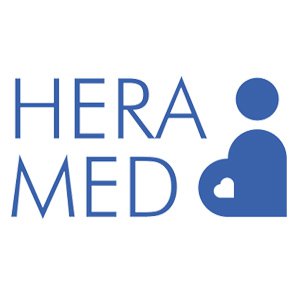
Market Capitalisation: $17.03 million
Share Price: $0.17
Here’s why I like HeraMED...
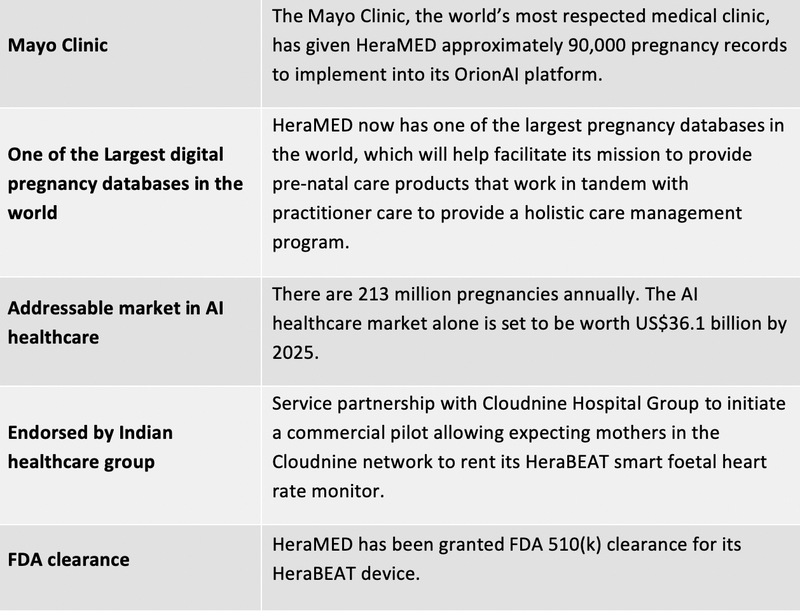
AI and healthcare: the perfect match
HeraMED (ASX:HMD) has received approximately 90,000 pregnancy records from research and development collaborator the Mayo Clinic, giving it access to an industry leading digital pregnancy monitoring database.
The records will be implemented into its OrionAI platform, a cloud based machine learning software-as-a-service (SaaS) platform being developed with the Mayo Clinic.
OrionAI plans to utilise big data and analyse thousands of pregnancy records in real time to enable potentially unprecedented analysis accuracy.
Here’s how OrionAI could change pregnancy healthcare:
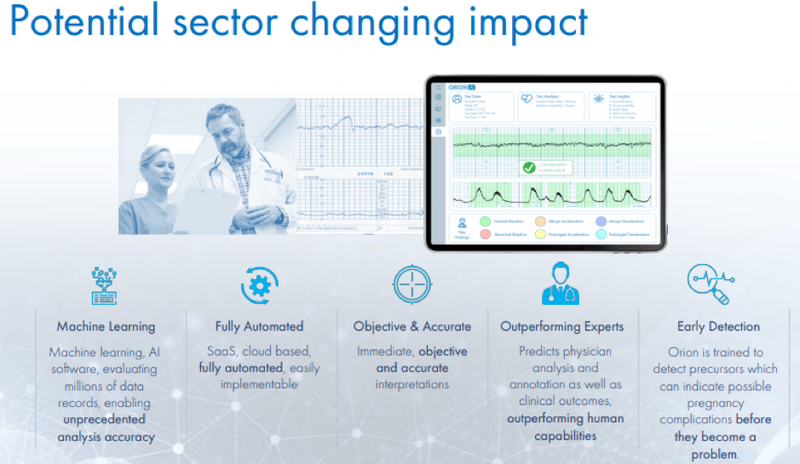
The platform aims to detect pregnancy complications early, which could have a significant and highly positive impact on expectant mothers and unborn children.
The following graphic explains how this important piece of AI works:
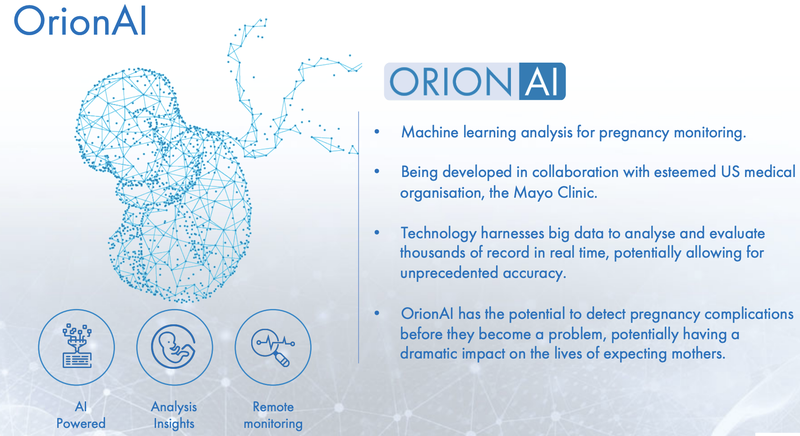
OrionAI is intended to reduce costs for hospitals and clinics, as well as optimising the efficiency of medical professionals. It is following a newly forged path whereby artificial intelligence is being used to detect tumours, manage diabetes and heart disease, whilst connecting surgeons with doctors and nurses and to ensure that patient histories are up to date and known to all relevant parties.
As we know, in the case of Orion, it is the result of HeraMED’s research achievements in pregnancy monitoring analysis and is trained to detect precursors that can indicate possible pregnancy complications before these become a problem.
OrionAI integrates massive pregnancy monitoring datasets with Convolutional Neural Nets (CNNs), deep learning algorithms in order to identify both existing as well as new risk factors.
"It empowers physicians, offering them an opportunity to get free from the tedious, scut work, giving them time to apply their knowledge in a more focused, intelligent and efficient way,” says HeraMED CEO David Groberman.
Data is critical. It is required for developing machine learning algorithms for the health care industry; thousands of data records are required for accuracy.
HeraMED is looking to implement the hundreds of thousands of data records of pregnancy monitoring information in the world.
The 90,000 records coming from the Mayo Clinic is more than an enormous step forward. It’s a game changer for the company to dramatically improve the efficacy of the algorithms with such a vast database.
When we caught up with Groberman last year he told us, “We've started with the Mayo Clinic and in the long term we are attempting to own the biggest repository of foetal monitoring information in the world. This will really allow us to fast track the development of the algorithms. It includes the physician and the patient and the result of the pregnancy. So, there's a lot of engineering and sophistication and machine learning work to be conducted, but the data place will be there for us to work on.
“We're now working with additional, potential partners across the world in order to have more and more data integrated into the algorithm.”
The importance of Mayo’s data
The data delivered by Mayo encapsulates ten years of activity at the hospital and was extracted over 12 months from the Mayo Clinic’s historical records by its Artificial Intelligence and Machine Learning experts.
Records will be housed on a HIPAA (Health Insurance Portability and Accountability Act) compliant secure server, ensuring it is properly stored and secured. The records are high-quality and comprehensive and include cardiotocography (CTG) data or birth stage monitors, as well as non-stress test (NST) data, encompassing earlier stages of pregnancy.
NST data allows for the development of OrionAI algorithm extensions to analyse earlier stages of pregnancy, which will assist HeraMED in incorporating OrionAI with HeraCARE to provide a more homogeneous solution.
Having a large volume of records, which includes the results of the majority of pregnancies will allow OrionAI’s machine learning functionalities to educate the algorithm to gain a better understanding of the correlations between physiological measurements and the effects these have on the pregnancy journey and the health of a baby.
Former LinkedIn scientist a key figure behind HMD’s AI
HeraMED has appointed leading, US-based data scientist, Uri Merhav (M.Sc in Physics, TAU, Magna Cum Lauda) as OrionaAI chief architect.
Mr Merhav was former staff machine learning engineer at LinkedIn and author of seven registered machine learning patents. He is a machine and deep learning expert and was fundamental in creating HeraMED’s first foetal heart rate algorithm.
Merhav joins HeraMED’s extensive innovation team which includes Dr Arturo Whschler MD, Oren Kapach (PhD Computer Science), Roei Tov (PhD Computer Science) and Yael Kierson (M.Sc. Medical Physics).

Commenting on the significance of this development in terms of optimising the group’s database, chief executive and co-founder Mr David Groberman said, “These records provide HeraMED with an unprecedented level of digital pregnancy monitoring database.
‘’This will assist our experts in turning OrionAI into the most advanced AI based diagnostic tool for medical use.
‘’Merhav is considered a prodigy and one of the brightest minds in machine learning, and bringing him to lead the company’s AI initiatives with his unique capabilities and proven knowledge is of great value.
“As additional datasets are implemented, OrionAI will only become stronger, smarter and more resilient.
‘’It will provide improved pregnancy monitoring solutions for expecting mothers, while also allowing medical professionals to optimise their time and become better patient advocates.
“We look forward to continuing our work with Uri and the Mayo Clinic and providing updates to shareholders as developments progress.”
The AI and digital healthcare boom
It is by no accident that HeraMED continues to achieve its milestone aims; it certainly hasn’t put the brakes on its momentum over the holiday period.
For a full history of the company read:
- ASX MedTech Transforming the US$50B Women’s Health Market
- HeraMED to Spring-Board German Pre Natal Market Entry by Partnering with Telehealth Provider Kinderheldin
The HeraMED team understand how vital digital transformation and AI is to the healthcare sector.
According to MedCity News: “Clinical decision support ... is one area where AI tools have been well received and seen a lot of adoption.”
Forbes reports: “The total public and private sector investment in healthcare AI is stunning: Al told, it is expected to reach $6.6 billion by 2021, according to some estimates. Even more staggering, Accenture predicts that the top AI applications may result in annual savings of $150 billion by 2026.”

According to Accenture, AI could help address some 20% of unmet clinical demand.
It is little wonder then, that companies such as Amazon have entered the space.
Both Apple (which is also moving from tech to health) and HeraMED view medical data management as critical to the future of healthcare. In 2018, Apple updated its Apple Health app so that it could display medical records from 39 hospitals. It also received FDA clearance for a new Apple Watch feature called the electrocardiogram (EKG), which is a more advanced method of heart monitoring.
Uber has made a big grab for the medical transit market. Uber Health will cater to people (sick or old) who can’t drive and need to get to the hospital.
Meanwhile, the Google Brain project uses AI-powered speech recognition to help physicians take notes during a hospital visit and connected home company Nest, which acquired a health-monitoring start-up and is interested in using its technology in nursing homes.
There is a further correlation here: Google Cloud is to be the cornerstone of the Mayo Clinic’s digital transformation as it attempts to redefine healthcare delivery.
Here is an excellent insight into how the big four tech companies are disrupting healthcare:
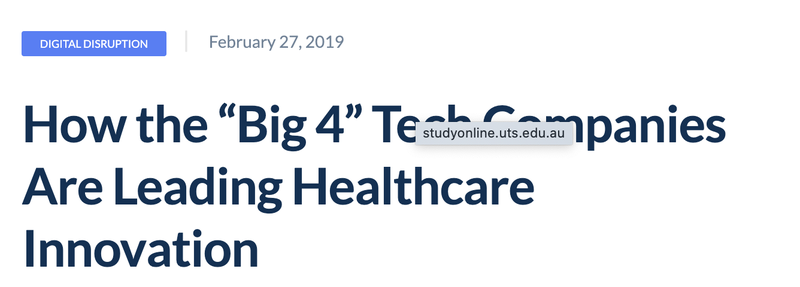
Looking at prenatal care specifically...
By 2025, the market potential in women’s health diagnostics, products and services is set to reach US$50 billion. In the US alone, there are 3.95 million births each year at a cost of US$111 billion – the second largest healthcare spend in the country.
Entry into this sector could be quite lucrative and with the work being done by HeraMED on a global scale, it too could have a major impact in its niche the near term.
Global influence
Since our last article in November, HeraMED has continued its steady progress.
Its pursuit of verification around the potential for its HeraBEAT and HeraCARE solutions to be reimbursed under the US reimbursement code system was a major step to US penetration.
If you are unfamiliar with HeraBEAT this video gives a simple explanation as to how it works:
Should this occur, under new CPT (Current Procedural Terminology) codes, users of HeraMED’s HeraBEAT and HeraCARE solutions would receive a full refund for the cost of the product.

Later in December, the company completed an A$1.4 million strategic placement, with funds used to progress business development including its expansion in the US.
The following graphic shows the advantages off the HeraBEAT technology:
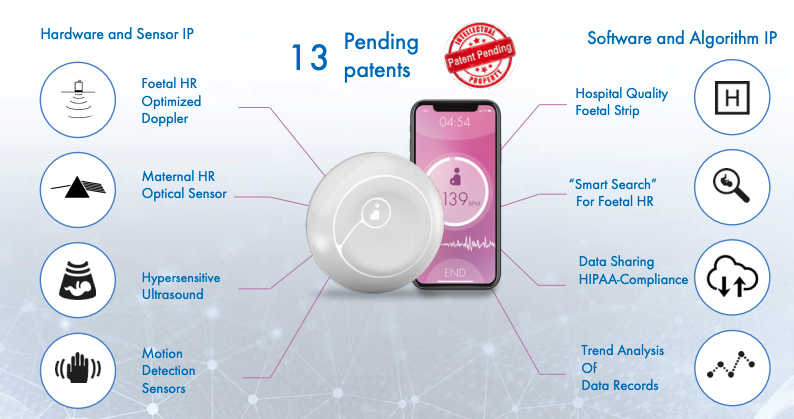
This technology and the continued growth of its pregnancy monitoring database, is behind HeraMED’s market penetration in Europe and the US.
HeraMED has big expansion plans into these jurisdictions this year.
Here’s a look at how the company intends to expand. Firstly, in the US:
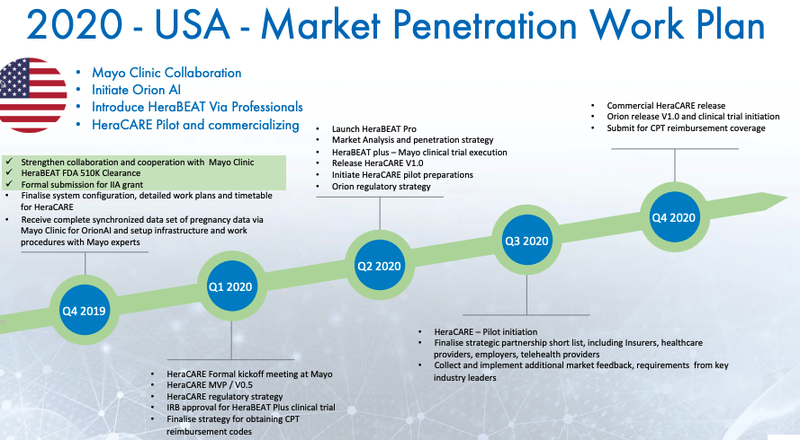
Next in Europe:
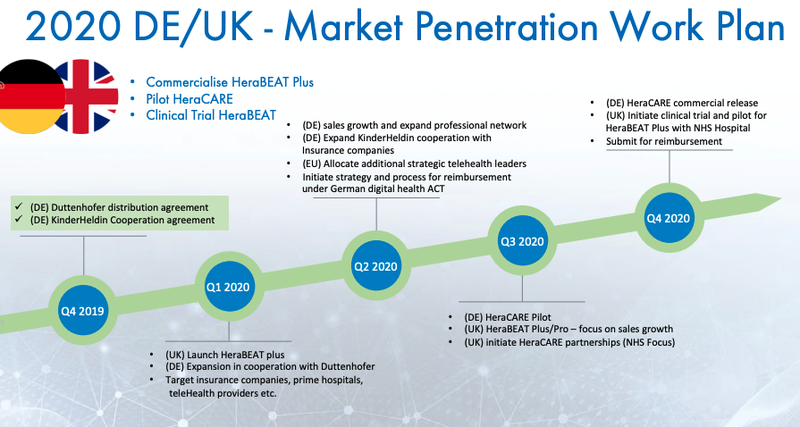
And in Brazil and India:
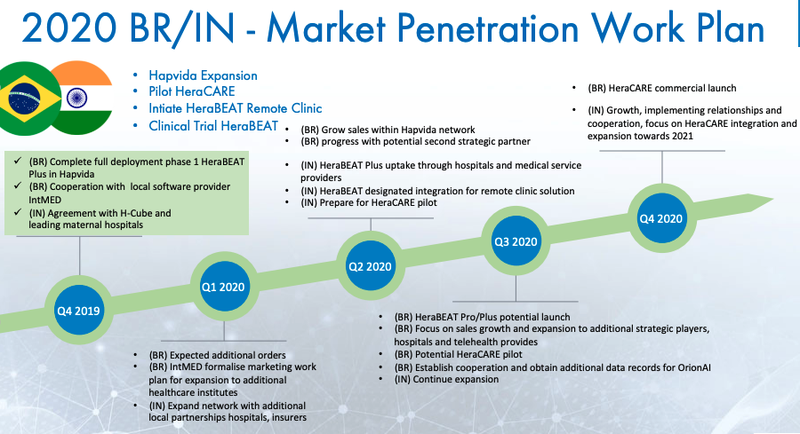
The growth of its pregnancy monitoring database is key to its growth.
Let’s not forget the Indian market
HeraMED Limited’s (ASX:HMD) distributor based in India has secured a commercial service partnership with a major Hospital Group to initiate a commercial pilot allowing expecting mothers in the network to rent its HeraBEAT smart foetal heart rate monitor.
HeraMED’s distribution partner, Consultus India secured the partnership which will see the devices sold under the h3 brand.
The service is already live in India with two hospitals, with broader uptake expected in the near term.
It is worth noting the potential opportunities that the broader Indian market could present for HeraMED — it represents a large addressable market with an estimated 28 million births per year.
Highlighting the significance of this endorsement by another leading healthcare group, chief executive and co-founder Mr David Groberman said, “Our market entry into India shows positive progress in a short period of time.
‘’The company’s technology has received another strong acknowledgement from a leading healthcare institution.
“The HeraBEAT product provides a gold standard alternative to significantly more expensive competitor products and we are glad to have the opportunity to provide the device and peace of mind to expecting mothers across India.”
The final word
HeraMED has a long list of achievements since listing in 2018:
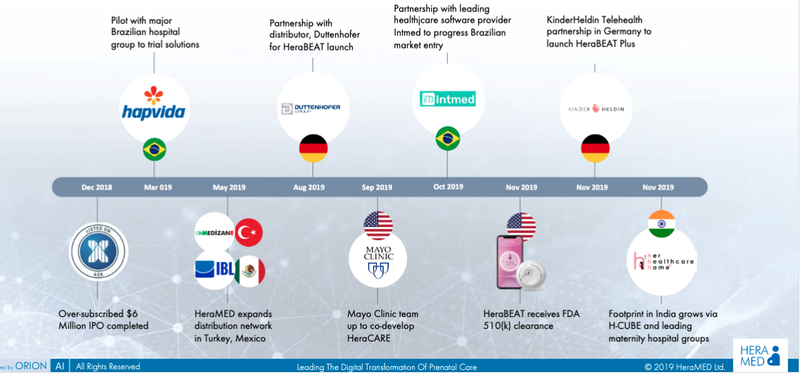
Now, with HeraMED developing its OrionAI cloud based machine learning Software-as-a-Service (SaaS) platform in collaboration with the Mayo Clinic, the addition of extensive pregnancy data records will be invaluable to its future aims.
The success of OrionAI is instrumental in helping the group to achieve the goal of dramatically improving the lives of both expectant mothers and unborn children, while reducing costs and optimising the physician’s efficiency.
The implementation of the pregnancy records into the OrionAI platform results in HeraMED owning one of the world’s largest digital pregnancy monitoring database.
The data will allow HeraMED to further develop its OrionAI platform ahead of schedule and allow it to accelerate OrionAI’s development phase, while the company continues to progress agreements with top-tier medical organisations to implement additional medical records into the algorithm.
As HeraMED acquires additional data sets, the more accurate and resilient the platform will become.
This can only mean big things for the company in 2020.
General Information Only
S3 Consortium Pty Ltd (S3, ‘we’, ‘us’, ‘our’) (CAR No. 433913) is a corporate authorised representative of LeMessurier Securities Pty Ltd (AFSL No. 296877). The information contained in this article is general information and is for informational purposes only. Any advice is general advice only. Any advice contained in this article does not constitute personal advice and S3 has not taken into consideration your personal objectives, financial situation or needs. Please seek your own independent professional advice before making any financial investment decision. Those persons acting upon information contained in this article do so entirely at their own risk.
Conflicts of Interest Notice
S3 and its associated entities may hold investments in companies featured in its articles, including through being paid in the securities of the companies we provide commentary on. We disclose the securities held in relation to a particular company that we provide commentary on. Refer to our Disclosure Policy for information on our self-imposed trading blackouts, hold conditions and de-risking (sell conditions) which seek to mitigate against any potential conflicts of interest.
Publication Notice and Disclaimer
The information contained in this article is current as at the publication date. At the time of publishing, the information contained in this article is based on sources which are available in the public domain that we consider to be reliable, and our own analysis of those sources. The views of the author may not reflect the views of the AFSL holder. Any decision by you to purchase securities in the companies featured in this article should be done so after you have sought your own independent professional advice regarding this information and made your own inquiries as to the validity of any information in this article.
Any forward-looking statements contained in this article are not guarantees or predictions of future performance, and involve known and unknown risks, uncertainties and other factors, many of which are beyond our control, and which may cause actual results or performance of companies featured to differ materially from those expressed in the statements contained in this article. S3 cannot and does not give any assurance that the results or performance expressed or implied by any forward-looking statements contained in this article will actually occur and readers are cautioned not to put undue reliance on forward-looking statements.
This article may include references to our past investing performance. Past performance is not a reliable indicator of our future investing performance.

